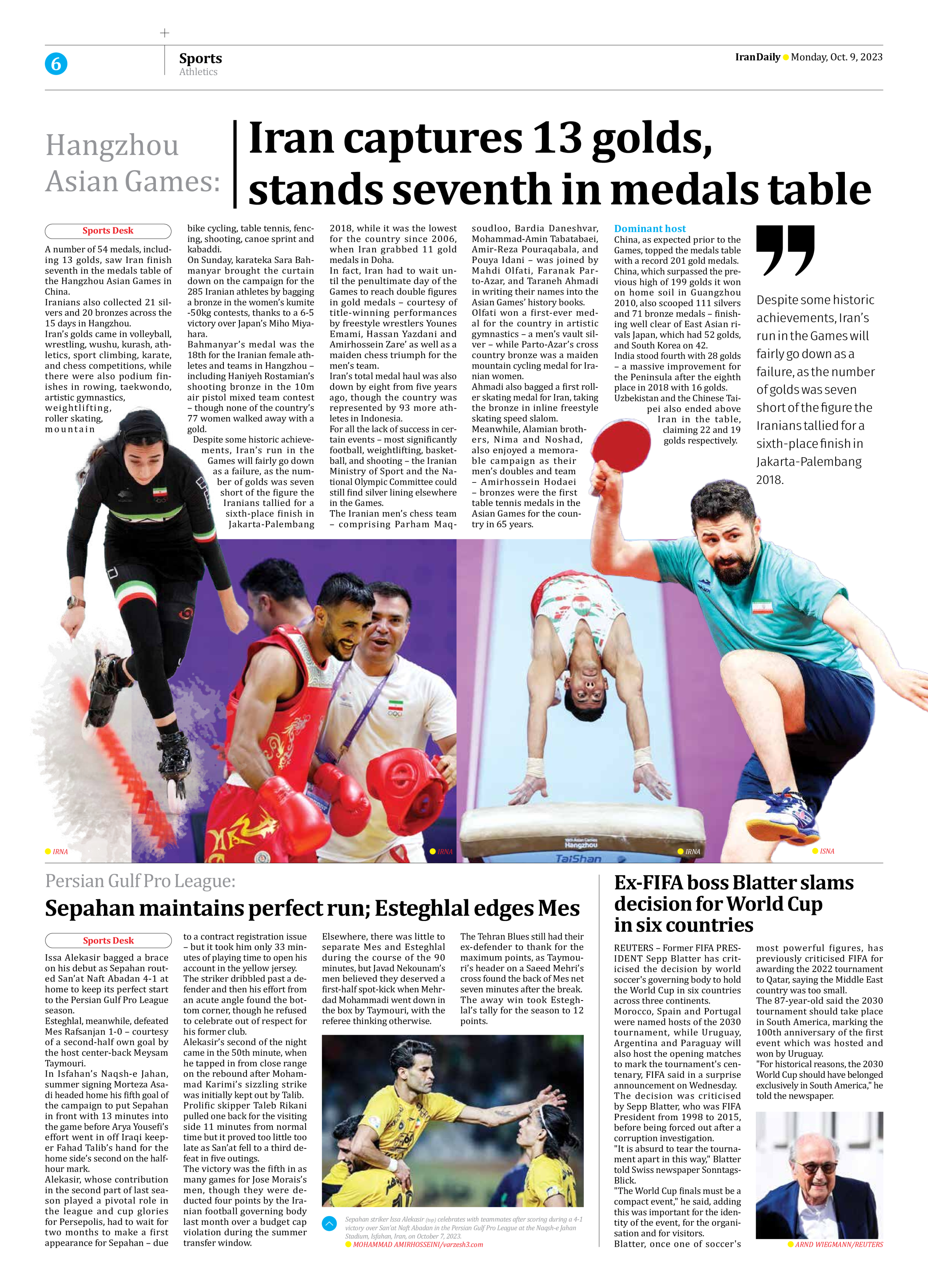
Hangzhou Asian Games:
Iran captures 13 golds, stands seventh in medals table
A number of 54 medals, including 13 golds, saw Iran finish seventh in the medals table of the Hangzhou Asian Games in China.
Iranians also collected 21 silvers and 20 bronzes across the 15 days in Hangzhou.
Iran’s golds came in volleyball, wrestling, wushu, kurash, athletics, sport climbing, karate, and chess competitions, while there were also podium finishes in rowing, taekwondo, artistic gymnastics, weightlifting, roller skating, mountain bike cycling, table tennis, fencing, shooting, canoe sprint and kabaddi.
On Sunday, karateka Sara Bahmanyar brought the curtain down on the campaign for the 285 Iranian athletes by bagging a bronze in the women’s kumite -50kg contests, thanks to a 6-5 victory over Japan’s Miho Miyahara.
Bahmanyar’s medal was the 18th for the Iranian female athletes and teams in Hangzhou – including Haniyeh Rostamian’s shooting bronze in the 10m air pistol mixed team contest – though none of the country’s 77 women walked away with a gold.
Despite some historic achievements, Iran’s run in the Games will fairly go down as a failure, as the number of golds was seven short of the figure the Iranians tallied for a sixth-place finish in Jakarta-Palembang 2018, while it was the lowest for the country since 2006, when Iran grabbed 11 gold medals in Doha.
In fact, Iran had to wait until the penultimate day of the Games to reach double figures in gold medals – courtesy of title-winning performances by freestyle wrestlers Younes Emami, Hassan Yazdani and Amirhossein Zare’ as well as a maiden chess triumph for the men’s team.
Iran’s total medal haul was also down by eight from five years ago, though the country was represented by 93 more athletes in Indonesia.
For all the lack of success in certain events – most significantly football, weightlifting, basketball, and shooting – the Iranian Ministry of Sport and the National Olympic Committee could still find silver lining elsewhere in the Games.
The Iranian men’s chess team – comprising Parham Maqsoudloo, Bardia Daneshvar, Mohammad-Amin Tabatabaei, Amir-Reza Pouraqabala, and Pouya Idani – was joined by Mahdi Olfati, Faranak Parto-Azar, and Taraneh Ahmadi in writing their names into the Asian Games’ history books.
Olfati won a first-ever medal for the country in artistic gymnastics – a men’s vault silver – while Parto-Azar’s cross country bronze was a maiden mountain cycling medal for Iranian women.
Ahmadi also bagged a first roller skating medal for Iran, taking the bronze in inline freestyle skating speed slalom.
Meanwhile, Alamian brothers, Nima and Noshad, also enjoyed a memorable campaign as their men’s doubles and team – Amirhossein Hodaei – bronzes were the first table tennis medals in the Asian Games for the country in 65 years.
Dominant host
China, as expected prior to the Games, topped the medals table with a record 201 gold medals.
China, which surpassed the previous high of 199 golds it won on home soil in Guangzhou 2010, also scooped 111 silvers and 71 bronze medals – finishing well clear of East Asian rivals Japan, which had 52 golds, and South Korea on 42.
India stood fourth with 28 golds – a massive improvement for the Peninsula after the eighth place in 2018 with 16 golds.
Uzbekistan and the Chinese Taipei also ended above Iran in the table, claiming 22 and 19 golds respectively.







